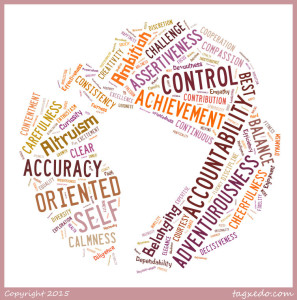 Culture is based on shared values. Values are the invisible glue that binds cultures together. You can argue that deep down, most humans share the same values. This is the universalist view of culture and is the strategy often used by teachers to try and find what binds their class together. And while true that we probably do share most of the same values, it is probably the relative importance of each value that leads to the differences we see in cultures.
Culture is based on shared values. Values are the invisible glue that binds cultures together. You can argue that deep down, most humans share the same values. This is the universalist view of culture and is the strategy often used by teachers to try and find what binds their class together. And while true that we probably do share most of the same values, it is probably the relative importance of each value that leads to the differences we see in cultures.
A recent survey of values across different countries illustrated very nicely how the same information can be interpreted in different ways. In the first report on values across the world, Czech people were labelled as the most decadent, whereas a re-framing of the results resulted in the headline that Czech people were the most tolerant. Same information, different perceptions.
Can you uncover values?
Yes, that is possible. It is probably a good idea to uncover your own values by using an exercise such as this one on Mindtools. This would help you understand how you react to certain behaviours in the classroom. For example, it is likely that you get irritated with late arrivals. And this uncovers your value of being mindful of other people’s time.
Should you uncover class values?
This may not be an exercise that would be appropriate for you to do explicitly with a class. If we recall that that the overall aim of culturally responsive teaching is the creation of an effective learning community, then you could use some of the questions from the MindTools exercise individually as part of that process where you are learning more about your students, their needs and expectations. Kyle Schwartz got her 3rd grade students to complete the following sentence early in 2015 I wish my teacher knew… and this gave her all sorts of background information to better understand her students’ different backgrounds. This gave Mark Barnes the idea to suggest intentionally collecting such information in a rubric. Could this be adapted to the adult ed classroom but with different headings? I see this as a mind experiment rather than an actual table that an adult ed teacher would fill in. Can you think of other ways of uncovering the values of your students that could help you in the classroom?
Comments
2 responses to “Values: The glue of culture”